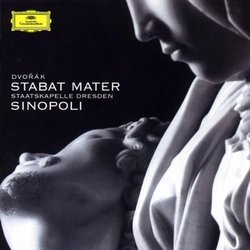Sorrowful
D. Seymour | Atlanta, GA USA | 05/30/2002
(5 out of 5 stars)
"Antonin Dvorak's Stabat Mater is an achingly beautiful masterpiece. As a choral work, it is a brilliant outpouring of grief and sorrow. Here, Giuseppe Sinopoli's recording with the Staatskapelle Dresden is dark and compelling. This recording benefits from Sinopoli's background as an opera conductor. Compared to the same piece rendered with hypnotic beauty by Robert Shaw, this version elevates the dramatic aspects. The swirling vortex of the opening movement "Stabat Mater dolorosa" draws you deep into Dvorak's own sorrow at the death of his children. Sinopoli's climaxes during the opening 20 minutes are monumental. The Bass Solo & Chorus of the fourth movement are as touching as Brahms' German Requiem. The fifth movement chorus "Tui nati vulnerati" allows some muted joy to intermingle with the grief. The final movement returns to the original vortex. Only this time the climax becomes triumphant - as if to say 'this too shall pass'. Great sound quality and balance for a live recording. The choir is never muddy, always crisp. I think the benifit of an audience here helps produce the adrenaline evident throughout the performance. An essential of any choral collection."
An emotionally intense, superb performance of Dvorak's score
John Kwok | New York, NY USA | 11/24/2001
(5 out of 5 stars)
"If this was Sinopoli's valedictory recording, I couldn't think of a better way of concluding his critically acclaimed career. He leads the Dresden Staatskapelle in yet another emotionally intense, warm performance noted for its intelligence and brilliant orchestral playing. The Dresden Staatskapelle's chorus matches the orchestra's playing in yielding a vigorous, warm performance of its own, never quite overshadowing the spectacular singing of the soloists - none of whom I have heard before. This is the first time I ever heard Dvorak's great work for chorus and orchestra; I was almost moved to tears."


 Track Listings (5) - Disc #1
Track Listings (5) - Disc #1